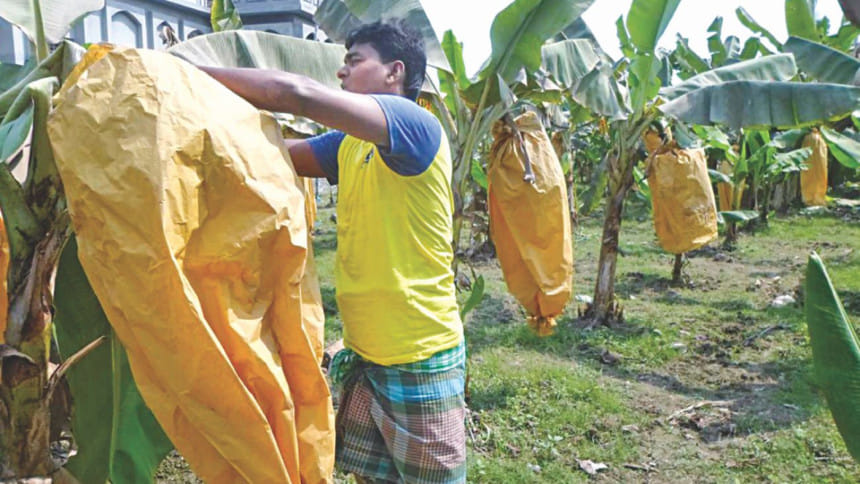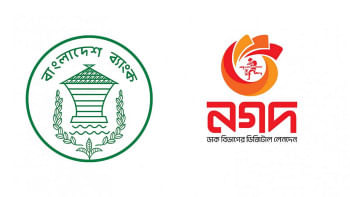Bags promise banana boost

For a long time the banana plantations in Rajshahi and Chapainawabganj have relied on pesticides. Now, eco-friendly bags to protect the ripening fruit promise to revolutionise the industry and make chemical-free bananas the marketplace standard. Moreover, the new 'safe' bananas open the door to exports.
“Most bananas [skins] are full of spots, which indicates chemical use,” says senior scientific officer from the regional horticulture research station in Chapainawabganj, Sorof Uddin. “In many cases, immature bananas are ripened in shady trenches using smoke and harmful carbide.” The scientist has long been seeking a healthier production alternative.
During his three-year stay in China as part of his PhD study, Sorof observed a bagging method to produce safe fruit. Polythene-paper bags are used to cover the fruit as it ripens, offering protection from strong sunshine, rain, fog and pest attack without the need for chemicals. From 2015, after his return to Bangladesh, Sorof worked to popularise the idea among mango growers. He also had an eye on the banana industry. Sorof hoped to find banana-growers willing to give the new system a try.
In 36-year-old pesticide trader Sujammel Haque, Sorof found an unlikely ally. Sujammel owns two pesticide shops in Baya market of Poba upazila in Rajshahi. Selling pesticides is the mainstay of his livelihood but the inherited business has never pleased him.
Sujammel's nephew Momin who works in one of the shops said, “My uncle says pesticides are killing us.
“He says commercial bananas are laced with chemicals and he's always wished for an alternative.”
Apart from being a pesticide trader, Sujammel is also an orchardist, with mango and banana groves set across two acres in his home village of Birostholi. Committed to the idea of safe fruit, when Sujammel met Sorof last December it was a meeting of like minds.
“I warned him,” Sorof recalls, “Once this method is established nobody would buy his pesticides.”
“I know the negative impact of pesticides on human health,” Sujammel says, “I chose to grow safe bananas anyway.” His bananas were first covered with bags on 24 December 2016. Results have exceeded expectations.
For farmers the fruit bagging system incurs an additional cost of Tk 27,000 per acre, with each bag costing up to Tk 40. But there are savings on pesticides and the safe fruit which offers a spot-free natural colour and sweet taste is attractive to consumers. Safe bananas can be sold at higher prices.
“It's a wonder to see my uncle's orchard,” says Momin. “The fluorescent yellow bags hanging in rows really distinguish it from neighbouring plantations. The colour of the ripe bananas is really impressive.”
Fetching up to Tk 70 per kg, a higher market price than for other bananas, Sujammel's first harvest from February 2017 netted him a profit of Tk 3 lakh from his two-acre orchard. Next season, with the new system fully implemented, he anticipates an equal profit per acre.
Meanwhile at Moheshpur village in Chapainawabganj sadar upazila, another banana grower Mohammad Rafez Mir, 25, has also been trialling fruit bags.
“I stopped spraying chemicals after introducing the bags this year,” he says. Rafez has 2,000 banana trees on 1.66 acres. “The bags cost money but they can be reused three times, fruit quality is improved and they also protect the fruit from birds and bats.”
Rafez has benefited from higher “safe banana” prices. “I earned an additional Tk 5,000 selling bananas over the last six weeks. I expect additional sales income of up to Tk 20,000 this season.”
But the bags offer an even greater benefit to growers: the opportunity for export. “We are talking with a buyer from Malaysia,” says Sorof. “If all goes well, Sujammel's bananas are destined for export this season.”
“Exporting bananas was beyond my dreams,” says Sujammel. “Whether that eventuates this year or not, I am so happy that I grew export-quality bananas.”


 For all latest news, follow The Daily Star's Google News channel.
For all latest news, follow The Daily Star's Google News channel. 



Comments